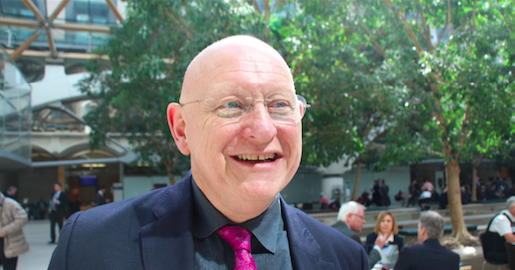17.11.2017 - 10:16
Hywel Williams (1953) is a Plaid Cymru lawmaker who chairs Westminster’s All Party Parliamentary Group on Catalonia (APPG), the active group of British MPs who monitor the Catalan case. Only yesterday they hosted a debate with representatives of several left-wing Catalan parties. They posed a number of interesting questions to Alan Duncan, Britain’s Minister for Foreign and Commonwealth Affairs. The debate can be accessed here. Williams himself was one of the international observers who visited Catalonia on occasion of the referendum on independence. In this telephone interview, he tells us how he sees the current situation.
—How do you see the current situation in Catalonia from the UK?
—For the EU in general, it is a huge challenge. Likewise for anyone who openly supports democracy and respects opinions, on Catalan independence, too. I believe that some actions by the Spanish government are clearly anti-democratic: the events on the day of the referendum and the following days, as well as the arrests of Catalan political and grassroots leaders. The silence of most EU leaders and, in general, of the European countries, is an embarrassment. Their silence gives hope to the people who have an oppressive outlook. You only need to look at the scope of the authoritarian nationalism that has swept across eastern Europe in recent years to become seriously concerned. On this point, I think PM Rajoy holds a very biased, partisan position and does not prioritise the interest of the Spanish people, of Europe as a whole and of Catalans in particular.
—Rajoy claims that his attitude is not anti-democratic but, rather, that the Catalan government have broken the law.
—The Catalan government was appointed following an election with a very high turnout, which gave them a majority in parliament. The Catalan government has all the democratic legitimacy. On the day of the independence referendum 43 per cent of the electoral roll cast a vote, despite the Spanish government’s many warnings about the referendum being illegal. We all saw what the Spanish police did that day. For that very reason, a 43 per cent turnout is incredible. And a vast majority of voters chose independence. Had it been a fair, free and democratic vote, without a police crackdown, who knows what the result might have been. Now we know that, in order to win, those who oppose independence would need to get most of the votes of the people who stayed at home and turnout would have to be massive. In that regard, the referendum on October 1 was a conclusive victory for independence supporters. Madrid’s only response to that victory has been to jail half the government, the people who organised the vote. Shooting the messenger is never a good idea. And that’s what the Spanish government has done in this instance. Clearly. The majority has been swept away by the Spanish government’s actions. Obviously, that is a political problem and it’s not up to a court of law to resolve it.
—How do you feel about the upcoming snap elections in Catalonia?
—I welcome the elections on December 21. However, polls must be held in total freedom. Also for the people who wish to take part in the campaign. You cannot achieve that, if some people are in prison or exile. The actions by the Spanish government might increase the Catalans’ suspicions that the elections aren’t free and fair, like everyone wants. The UE should make sure of it. There are political leaders across Europe who are trying to do that. I’m saying this after a number of chats with officials in Brussels. However, my impression is that no measures have been taken yet.
—Do you not trust the Spanish government enough? Is that it?
—I’m saying that governments all over Europe should take a clear stand and, so far, they haven’t. They keep toeing the same line: it’s a Spanish internal affair, it’s a legal matter. But, clearly, it is a test for Spain’s democratic credentials and, to a greater extent, for democracy across Europe. That’s what you call a litmus test, if I’m not mistaken.
—You came to Catalonia on October 1 and were an international observer for the referendum. What are your memories of that?
—I was surprised by the peaceful, non-violent determination of ordinary people. They wanted their voice to be heard. And I remember the police action, which I witnessed in one polling station, to seize the ballot boxes, the slips, everything. I saw that it was clearly a movement of the people. I don’t need to tell you that: for years millions of people have been marching in the streets demanding democracy and independence. It is a movement of the people.
—What was Westminster’s reaction following the arrest of half the Catalan government?
—The ruling parties in Westminster do not support Catalan independence. Clearly. Still, people are concerned about the lack of democracy in a European country. It is very alarming. There is concern, indeed.
—Can you picture the UK recognising an independent Catalonia one day?
—I don’t think the UK will break its ties with Spain, for now. At the moment there is little doubt about that. But whenever we have held a debate on the Catalan issue, every speaker has at least voiced concern about the situation in Catalonia. Everyone except the cabinet minster, who dropped the usual line: this is a legal matter for the Spanish government to resolve. We have received support from every party, all of them except Northern Ireland’s unionists.



